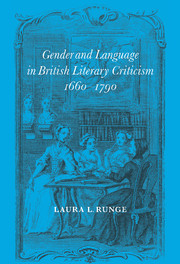4 - Aristotle's sisters: Behn, Lennox, Fielding, and Reeve
Published online by Cambridge University Press: 15 September 2009
Summary
Criticism is a goddess easy of access and forward of advance, who will meet the slow and encourage the timorous.
JohnsonThe unprecedented increase in the practice of criticism during the eighteenth century spawns numerous satires that, like Samuel Johnson's famous Dick Minim papers, express anxiety over who has the right to perform such cultural arbitration. Johnson opens this issue of the Idler with a list of qualifications, ironically expressed as the standards that culture apparendy neglects:
Criticism is a study by which men grow important and formidable at a very small expense. The power of invention has been conferred by nature upon few, and the labour of learning those sciences which may, by mere labour, be obtained, is too great to be willingly endured; but every man can exert such judgment as he has upon the works of others; and he whom nature has made weak, and idleness keeps ignorant, may yet support his vanity by the name of a critick.
The satire suggests that especially bad writers can still be critics, and this democratic access to criticism necessitates its qualitative decline. That which distinguishes good critical work from poor can be read between the lines: an inherent sense of invention, fostered by learning, curbed by judgment, and sustained by strength of mind – the definitive, masculine qualities of literature. Dick Minim represents the threat of an under-educated literate populace gaining the leisure to pursue vanity under the guise of wit.
- Type
- Chapter
- Information
- Gender and Language in British Literary Criticism, 1660–1790 , pp. 121 - 167Publisher: Cambridge University PressPrint publication year: 1997

